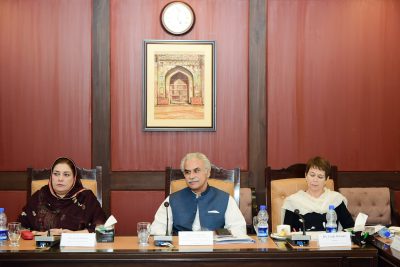
Pakistan Institute for Parliamentary Services (PIPS) organized a roundtable on “Labour Standards in Export-Led Sectors in Pakistan” on Thursday, August 22, 2019 at PIPS Main Campus in Islamabad. Special Assistant to Prime Minister on Health, Dr. Zafar Mirza, chaired the session which was attended by around 25 participants including Member of Parliament, government officials, civil society representatives and PIPS faculty. PIPS collaborated with the Pakistan Institute for Labour Education and Research (PILER) to jointly organize the absorbing event.
Mr. Muhammad Rashid Mafzool Zaka, Executive Director and Senior Director General (Research and Legislation) PIPS, presented welcome remarks, and highlighted the significance of research on labour standards in export-led sectors in Pakistan. In his introductory remarks the head of delegation PILER, Mr. Zulfiqar Shah said that states are showing increasing concern regarding modern slavery and prevention of child labor and such laws are imminent for not only uplifting the condition of labor force but also for increasing exports. Ms. Cindy Berman, Head of Modern Slavery Strategy at the Ethical Trading Initiative, gave detailed presentation on “Programme on Labour Standards in Export-Led Sectors.” She lamented the impunity on the business community towards violations and malpractices with regard to internationally agreed labour standards. She spoke specifically with regard to the surgical sector based in Sialkot. Surgical instruments produced in Pakistan end up in public and private healthcare centers all over the world especially Europe. Consumers are now much more concerned about where the products come from and the overall process being transparent and ethical.
Ms. Zeenat Hisam, Senior Researcher, further spoke about the research on surgical sector in Pakistan. She noted that Punjab Government has declared manufacturing surgical instruments as hazardous for children. Despite this children are involved in this dangerous occupation in informal sector. She also shed light on lack of skill development to treat it as a proper profession, often resulting in low wages.
Workers are also provided no social security or any other benefits especially in the informal workshops as well as insufficient facilities in the workplace. Sub-Contracting and per piece payment rate force workers to live in poverty. She also highlighted the fact that international buyers mostly dictate the prices which are non-negotiable, which is one of the reasons for low wages. Scarcity of resources hinders labor inspectors from performing their role efficiently.
Deliberating further on the research study, Ms. Zeenia Shaukat, Researcher PILER, laid emphasis on the need to ensure that wages are increased in line with actual living costs. She also emphasized the need to formally register all workers through SCCI and SIMAP to access social security benefits. This will also improve governance and monitoring.
Presenting his findings on the “surgical instrument industry in Pakistan” Mr. Muhammad Hanif Khan Nasar, Consultant PIPS, said thatPakistan exports over 10,000 different medical instruments globally. This industry employs over 100,000 skilled and unskilled workers. According to Pakistan Bureau of Statistics, Pakistan’s surgical goods exports were estimated at US $253 Million during July 2018-February 2019. While highlighting the causes of major problems in the industry, he said that reliance on old technology and no direct access to buyers in exporting countries forces them to sell goods cheaper.
A critical review of the research study was conducted by the participants during the discussion on roadmap to drive up labour standards in export-led sectors in Pakistan. Participants pointed out serious shortcomings in the research study including the data sampling. They also highlighted the problems associated with foreign buyers when it comes to paying wages in Pakistan.
Honorable MNA Ms. Zille Huma, Member National Assembly Standing Committee on Human Rights, appreciated the efforts of PIPS and PILER in raising the voice of the exploited workers. She said child labor is an appalling reality of our society. Elimination of child labour is difficult and requires time. She stressed that government needs to take affirmative actions to eradicate poverty as per their promise so children are not forced to work in hazardous situations. It is the responsibility of the government to make sure that children have pens in their hands and not tools. She appreciated the PIPS Research and Legislation wing and PILER for the roundtable on such imperative topic.
Mr Muhammad Rashid Mafzool Zaka, Executive Director PIPS also reiterated the need for three prong strategy to improve labour standards : skills development for workers especially aged 14 years so that by adulthood they have studied as well as attained skill needed in industry, secondly foreign vendors and buyers should be persuaded to offer better pricing for surgical goods produced to enable local producer to offer minimum and better wages and last bu not lest govt should implement the labor laws existing in Pakistan. Special Assistant to Prime Minister on Health, regulations and coordination Dr. Zafar Mirza stressed the need of regulating and formalizing the informal sector so that those workers are also entitled to social security and better living standards. Quoting the example of the state of Madinah, he said that affirmative actions must be taken for the social uplift of the vulnerable population. He was of the view that Prime Minister’s Ehsaas program should specifically target the people of informal sector and it will be a great opportunity to mainstream the issue of informal and under-paid workers into political agenda.
A set of PIPS publications was presented to each panelist as a token of appreciation. The event concluded with vote of thanks which was moderated by Ms. Fakiha Mahmood, Research Officer PIPS.